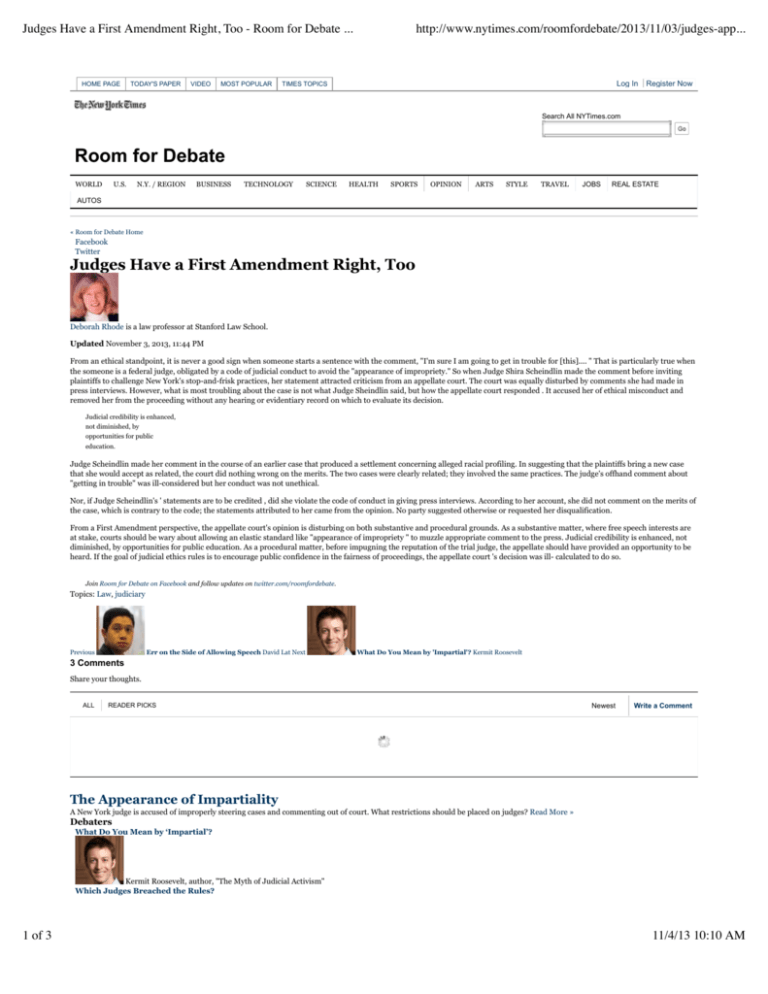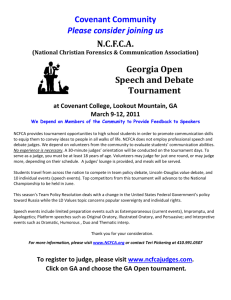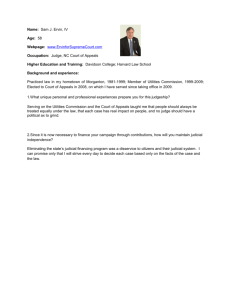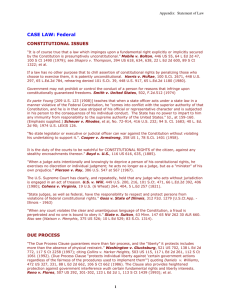Judges Have a First Amendment Right, Too
advertisement

Judges Have a First Amendment Right, Too - Room for Debate ... HOME PAGE TODAY'S PAPER VIDEO MOST POPULAR http://www.nytimes.com/roomfordebate/2013/11/03/judges-app... Log In TIMES TOPICS Register Now Search All NYTimes.com Room for Debate WORLD U.S. N.Y. / REGION BUSINESS TECHNOLOGY SCIENCE HEALTH SPORTS OPINION ARTS STYLE TRAVEL JOBS REAL ESTATE AUTOS « Room for Debate Home Facebook Twitter Judges Have a First Amendment Right, Too Deborah Rhode is a law professor at Stanford Law School. Updated November 3, 2013, 11:44 PM From an ethical standpoint, it is never a good sign when someone starts a sentence with the comment, "I'm sure I am going to get in trouble for [this].... " That is particularly true when the someone is a federal judge, obligated by a code of judicial conduct to avoid the "appearance of impropriety." So when Judge Shira Scheindlin made the comment before inviting plaintiffs to challenge New York's stop-and-frisk practices, her statement attracted criticism from an appellate court. The court was equally disturbed by comments she had made in press interviews. However, what is most troubling about the case is not what Judge Sheindlin said, but how the appellate court responded . It accused her of ethical misconduct and removed her from the proceeding without any hearing or evidentiary record on which to evaluate its decision. Judicial credibility is enhanced, not diminished, by opportunities for public education. Judge Scheindlin made her comment in the course of an earlier case that produced a settlement concerning alleged racial profiling. In suggesting that the plaintiffs bring a new case that she would accept as related, the court did nothing wrong on the merits. The two cases were clearly related; they involved the same practices. The judge's offhand comment about "getting in trouble" was ill-considered but her conduct was not unethical. Nor, if Judge Scheindlin's ' statements are to be credited , did she violate the code of conduct in giving press interviews. According to her account, she did not comment on the merits of the case, which is contrary to the code; the statements attributed to her came from the opinion. No party suggested otherwise or requested her disqualification. From a First Amendment perspective, the appellate court's opinion is disturbing on both substantive and procedural grounds. As a substantive matter, where free speech interests are at stake, courts should be wary about allowing an elastic standard like "appearance of impropriety " to muzzle appropriate comment to the press. Judicial credibility is enhanced, not diminished, by opportunities for public education. As a procedural matter, before impugning the reputation of the trial judge, the appellate should have provided an opportunity to be heard. If the goal of judicial ethics rules is to encourage public confidence in the fairness of proceedings, the appellate court 's decision was ill- calculated to do so. Join Room for Debate on Facebook and follow updates on twitter.com/roomfordebate. Topics: Law, judiciary Previous Err on the Side of Allowing Speech David Lat Next What Do You Mean by 'Impartial'? Kermit Roosevelt 3 Comments Share your thoughts. ALL READER PICKS Newest Write a Comment The Appearance of Impartiality A New York judge is accused of improperly steering cases and commenting out of court. What restrictions should be placed on judges? Read More » Debaters What Do You Mean by ‘Impartial’? Kermit Roosevelt, author, "The Myth of Judicial Activism" Which Judges Breached the Rules? 1 of 3 11/4/13 10:10 AM Judges Have a First Amendment Right, Too - Room for Debate ... http://www.nytimes.com/roomfordebate/2013/11/03/judges-app... Nancy Gertner, former judge Err on the Side of Allowing Speech David Lat, founder, Above the Law Judges Have a First Amendment Right, Too Deborah Rhode, law professor Related Discussions If Police Encounters Were Filmed Should police officers be required to wear cameras that record their interactions with the public? Reconsidering Young Lifers' Sentences Should prisoners serving mandatory life sentences without parole who committed their crimes as juveniles be eligible for a new sentencing hearing? Is the Civil Rights Era Over? With rulings on affirmative action, voting rights and same-sex marriage, are we seeing the end of the civil rights movement? Did it win? Out of Officials' Hands and Onto the Ballot Should voters enact more local laws through ballot initiatives? Or would that become too chaotic? Room for Debate Like 60,046 people like Room for Debate. Facebook social plugin Recent Discussions 2 of 3 11/4/13 10:10 AM Judges Have a First Amendment Right, Too - Room for Debate ... http://www.nytimes.com/roomfordebate/2013/11/03/judges-app... Giving Stilettos the Business Too Many Bodies, Too Little Space Should High School Last Six Years? Should You Bribe Your Kids? If Jews Skip Synagogue and Christians Skip Church Home World U.S. N.Y. / Region © 2012 The New York Times Co. 3 of 3 Privacy Business Technology Your Ad Choices Science Terms of Service Health Sports Corrections Opinion RSS Arts Style First Look Travel Help Jobs Real Estate Autos Back to Top Contact Us Work for Us Advertise Site Map 11/4/13 10:10 AM




